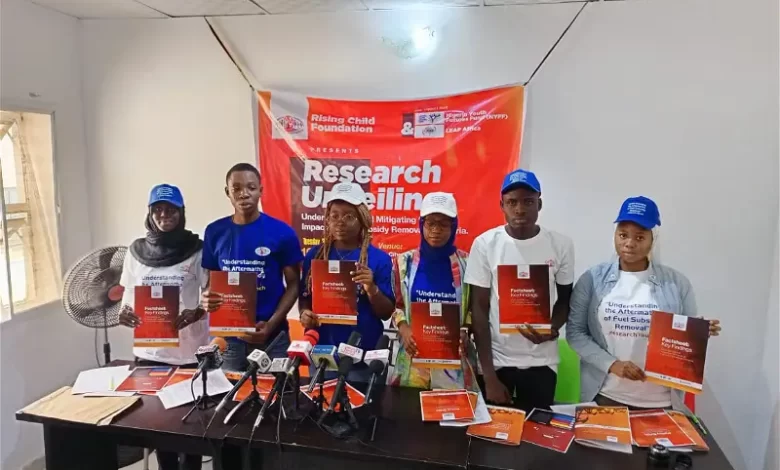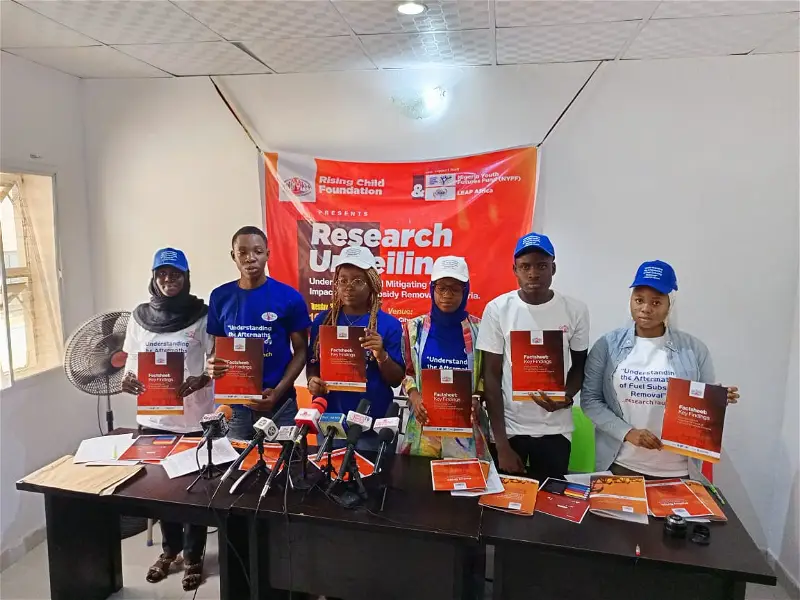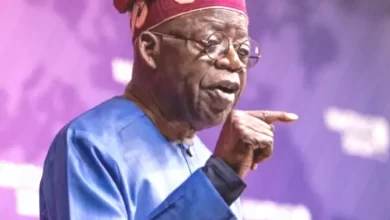Fuel subsidy removal Fresh Update With NGP Task

Fuel subsidy removal Fresh Update With NGP Task
Fuel subsidy removal: The Rising Child Foundation (RCF), a nonprofit organization, has urged the Federal Government to undertake a thorough review of the current palliative measures to address inefficiencies and ensure transparency in the disbursement mechanisms, as Nigerians continue to suffer from the harsh effects of the removal of fuel subsidies.
The organization also suggested to the government further interventions that may be put in place to deliver relief, especially to the vulnerable in Nigeria, to lessen the effects of the loss of fuel subsidies.
The RCF’s Executive Director, Taibat Hussain, emphasized the recommendations during a press conference in Ilorin, the capital of Kwara state, where she unveiled the organization’s Research Report on the impact of fuel subsidy removal in Nigeria.
She revealed that the research was funded by LEAP Africa and the Nigeria Youths Future Fund (NYFF) and that it was conducted in partnership with the Brain Builders Youth Development Initiative (BBYDI) with the aim of “assessing the impact of fuel subsidy removal and, more importantly, to develop data-driven practical interventions to mitigate its impact on Nigerians.”
Ruth Adeosun, the organization’s research intern, represented Hussain at the event. Hussain stated that although President Tinubu’s decision to halt fuel subsidy payments was necessary for long-term fiscal stability and sustainable economic growth, it has caused suffering and hardship for Nigerians, especially the most vulnerable members of society.
The head of the NGO emphasized that if the situation is not properly handled, it could result in higher rates of poverty in the nation because the majority of Nigerians are low-income earners and are finding it difficult to deal with the negative effects of the removal of subsidies, which include rising living expenses, higher transportation costs, and increases in the prices of necessities.

The RCF recommended that the federal government look into creative and affordable transportation options, give job creation for the hordes of unemployed youth priority, and set up a support system for small and medium-sized businesses that offer low-interest loans, subsidies, or tax breaks to help them adjust to the new economic climate to lessen the effects of the subsidy removal on the general public.
The NGO also recommended that the government spend money on alternate energy sources so that Nigerians would be less dependent on fuel-powered generators.
“The government must look into creative and affordable transportation options that can lighten the load on the populace,” the speaker declared. This should involve programs like transit vouchers and subsidies for ride-sharing services.
In addition, the government ought to think about offering particular rewards or subsidies to public transportation providers to preserve fare stability and lessen the impact on regular commuters. It should also encourage the use of fuel-free alternatives to transportation and make more focused investments in transportation infrastructure.
“Another major effect of the fuel subsidy removal is the loss of jobs due to the increase in operating costs for businesses,” she continued. Our findings demonstrate that Nigeria’s rising unemployment rate is exacerbating the negative consequences of the removal of gasoline subsidies. To match talents and skills with appropriate opportunities, the government must provide jobs and establish an environment for the economy.
While palliative care and other efforts would lessen the effects that Nigerians are experiencing, the progress that the palliative care initiatives are supposed to make will be impeded by the dearth of well-paying jobs, as many unemployed individuals will be forced to rely entirely on government assistance, making them liabilities. This emphasizes how crucial it is that the government give employment creation priority and make investments in sectors that can offer steady employment possibilities.
She concluded, citing the research results, that “businesses, particularly small-scale enterprises, have been significantly impacted by the removal of fuel subsidy.” To help small firms adjust to the changing economic climate, the government is encouraged to provide financial support in the form of low-interest loans, subsidies, or tax incentives.
“Furthermore, it is imperative to put policies in place that support corporate sustainability, like tailored subsidies for sectors negatively impacted by the elimination of subsidies.”
To promote transparency and inclusivity, the organization also urged the government to make sure that its policies are data-driven, involve the public in the decision-making process, and create and implement policies to address the unique difficulties faced by vulnerable groups, particularly those who are disabled.

“A key issue raised by the public during our investigation was the government’s lack of involvement and consultation before announcing the elimination of fuel subsidies. As a result, we urge all branches of government to constantly involve the public in the decision-making process to advance inclusivity and transparency.
Numerous venues, including town hall meetings, forums, and interactive conversations, can be used to accomplish this. Actively seeking feedback and involvement from the public builds a foundation of trust, adds insightful knowledge to the policymaking process, and supports inclusive and knowledgeable governance.
The government must proactively create and put into effect policies that are specifically designed to solve the problems that disadvantaged groups, especially those with disabilities, face. Policies of this kind must include actions to improve accessibility and offer ongoing support, acknowledging the unique and varied difficulties that these groups encounter daily.
She continued, “We think that all of these suggestions support an all-encompassing, compassionate, and cooperative approach to addressing the multifaceted challenges arising from Nigeria’s removal of fuel subsidies.”






